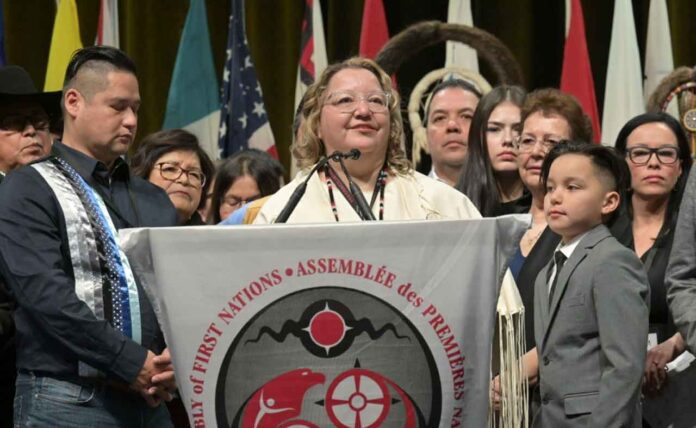National Chief Cindy Woodhouse Nepinak calls for continued efforts to secure better care for children
Calgary, AB (Treaty No. 7 Territory) – NEWS – The Assembly of First Nations (AFN) wrapped up its Special Chiefs Assembly on long-term reforms to the First Nations Child and Family Services (FNCFS) program. National Chief Cindy Woodhouse Nepinak addressed the Assembly, expressing gratitude to the Chiefs and leaders who traveled to participate in the vital discussions, while also acknowledging the challenges ahead.
“We are united by a common goal: to protect our children and families by securing an agreement that respects First Nations’ values and authority,” said Chief Nepinak. “This year saw the highest number of First Nations children removed from their homes in Canadian history. This must change.”
While the proposed $47.8 billion Final Agreement was not ratified, discussions highlighted the need for continued advocacy. The AFN Executive Committee will now return to negotiations, with the goal of securing a path forward that meets the needs of communities and ensures the well-being of future generations.
Nishnawbe Aski Nation (NAN) leaders, including Grand Chief Alvin Fiddler, voiced disappointment over the failed ratification but reiterated their commitment to ensuring First Nations control over child and family services, especially in remote areas like those in NAN territory. Chiefs from Ontario also supported this effort, emphasizing the urgency of reform.
Challenges Ahead for First Nations Child and Family Services Reform
- Critical Need for Change: Record numbers of First Nations children continue to be removed from their families, calling for urgent reform in child welfare policies.
- Diverse Perspectives: The Assembly revealed a range of views from First Nations across the country, with many advocating for a system that empowers families and communities.
- Next Steps in Negotiations: The AFN will return to the negotiation table, guided by the mandate to ensure First Nations children remain within their communities.
As the AFN continues its work, they acknowledge the efforts of leaders like Dr. Cindy Blackstock, as well as plaintiffs such as Ashley Bach, who have been instrumental in advocating for First Nations children’s rights. Moving forward, the AFN remains focused on establishing a system that reflects the values and needs of First Nations.







